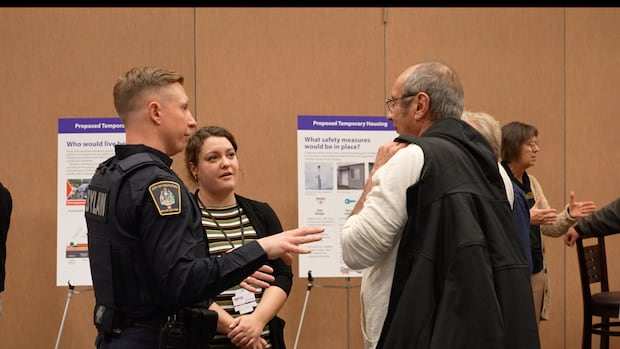British ColumbiaA proposed plan to build tiny homes that would house 50 homeless people in Penticton, B.C, continues to draw opposition as some residents express concern that the project includes overdose prevention services.The province has proposed to build 50 tiny homes to help address homelessness in the city Tiffany Goodwein · CBC News · Posted: Nov 26, 2025 8:00 AM EST | Last Updated: 3 hours agoListen to this articleEstimated 4 minutesThe audio version of this article is generated by text-to-speech, a technology based on artificial intelligence.Sixty tiny homes for unhoused people are in progress through a partnership between the province and the City of Kelowna. (Submitted by B.C. Housing)A proposed plan to build tiny homes that would house 50 homeless people in Penticton, B.C., continues to draw opposition as some residents express concern that the project includes overdose prevention services.The proposed project was announced late last month under the province’s Heart and Hearth program, an initiative that provides outreach services and housing. At a Nov. 4 council meeting, the city said the province would not fund the proposal if it was considered dry or free from substance use.But the province recently approved a 20-unit supportive housing project in Victoria that is dry under the same Heart and Hearth program. The facility is meant to support homeless people as they transition out of detox and begin recovery. The Independent MLA for Penticton-Summerland said the Victoria announcement has led to confusion.“The messaging from the city and the understanding from the residents was that only a wet facility would be funded here in Penticton, and I believe there is some confusion among the public as to why that is,” said Amelia Boultbee.The Ministry of Housing said the situation in Victoria is much different than the one in Penticton, given the provincial capital has more support services in place to address homelessness and addictions.“Victoria and elsewhere where there is already a fair amount of low- and medium-barrier housing that supports people coming off the streets, dry housing could be an important part of the continuum and we are doing a pilot in Victoria to look at just that,” said B.C. Housing Minister Christine Boyle.Boyle added that the 50-unit facility in Penticton would support more people in need of housing, such as people in the shelter system, encampments and on the streets.Penticton city council heard that a dry facility would only help 10 people versus 50 in the current proposal.Penticton’s last homeless count, conducted over a 24-hour period in April, estimated 194 people were experiencing homelessness, 81 per cent of whom face substance-use challenges.Nearly 300 people attended an information session on Nov. 20 about the project, many of whom had concerns about the proposal.David Parker, who attended an information session hosted by the city and B.C. Housing, says he is opposed to the tiny homes proposal. (Tiffany Goodwein/ CBC )“It’s a completely convoluted program to feed someone drugs and put them in a facility that is wet, where everyone is using and say that it is for the benefit of the individual,” said David Parker.But others believe the project is a positive step toward addressing homelessness in the city.”I think we need to do whatever we can to help out those who are most disenfranchised, those who are the most disadvantaged in our community,” said Nick Stulberg.Penticton isn’t the only community to experience pushback. Residents in Surrey, B.C., protested against a housing project that would offer housing and supports to people with substance-use disorders. Last week, city councillors voted to reassess the project, saying they heard enough opposition from community members with safety concerns.The lack of recovery supports available in Penticton has Boultbee calling on the NDP government to do more.“In my community, we have no detox beds, limited access to treatment facilities, no complex care and a one-year waitlist. It is no wonder we do not have enough people to fill a dry facility,” she said.Boultbee added that without appropriate interventions, vulnerable residents will remain stuck in a cycle of addiction.“The current plan provides no off-ramp for true treatment or a concrete plan to provide these resources.” Penticton city council is expected to vote on the tiny homes on Dec. 2.ABOUT THE AUTHORTiffany Goodwein is an award-winning journalist focused on covering Penticton and the south Okanagan area of British Columbia. She previously spent six years reporting in Alberta and is happy to be back home in B.C., where she grew up. You can contact her at tiffany.goodwein@cbc.ca With files from Chad Pawson
Concerns raised about proposed supportive housing project in Penticton











